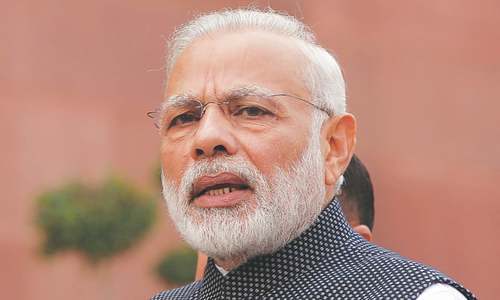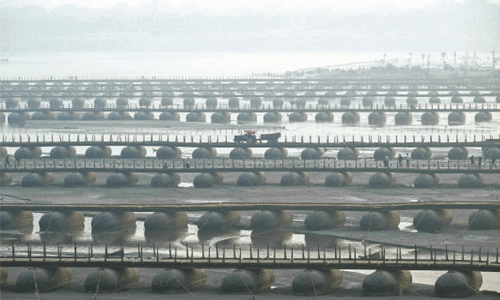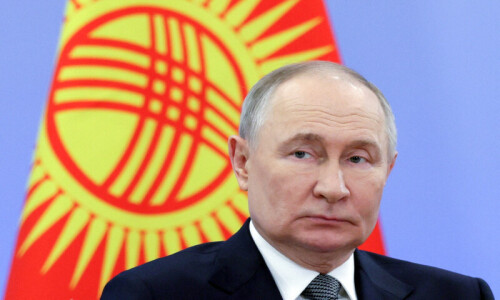
PUNDITRY notwithstanding, all five Indian states that went to polls recently saw their governments getting evicted. The victims included the Bharatiya Janata Party (BJP), Congress and the Uttar Pradesh-based Samajwadi Party. In a direct contest between the BJP and Congress in four of the states, it was two each. The BJP was ousted from Goa, which gives Prime Minister Modi his handpicked defence minister. The BJP and its Akali allies were shown the door in Punjab, the state from where Mr Modi promised to stop river water flowing to Pakistan.
What lessons are we to draw from these BJP defeats before we discuss Uttar Pradesh where the party trounced everyone and pulverised many into seeing a Modi wave? Anyone with the street power combined with a pliable media’s lung power, the kind the BJP commands today, can go to town with any number of wild interpretations on the verdict. His opponents, if they had the wherewithal, which they don’t, could claim, for example, that Punjab and Goa were mandates against Defence Minister Parrikar’s and Modi’s militarist policies with neighbours, which of course would be a canard. But the claim could be dressed up as fact with lungpower on TV. This is how pliable media markets political events — with spin and bias.
And this has been the pattern from the time the editor disappeared as the buffer between the newsroom and the proprietor, and the owners of TV channels and newspapers began to push their agenda as fact. The Modi wave is their interpretation of the recent state polls, but it bears little or no resemblance to fact.
Against two losses for the BJP, the Congress lost two of its own states in Manipur and Uttarakhand. If the smaller states of Goa and Manipur, which returned hung assemblies were not significant in anyone’s calculation, why would BJP president Amit Shah claim, falsely, that the BJP had won in four, instead of two states? Bluster works. In both Goa, where the BJP lost, and Manipur, where Congress lost, Congress emerged as the largest party.
What lessons are we to draw from the BJP defeats before we discuss UP where the party trounced everyone?
According to an encouraging precedence laid down by Rajiv Gandhi in 1989, the ruling party which loses the mandate in an election should not stake claim to form the new government without a majority even if it is the single largest party. Rajiv Gandhi, who was reduced from an unprecedented 400-plus seats to a minority, sat in the opposition despite Congress getting the highest tally. He let an archrival cobble a government with the support of the BJP and the Marxists.
In the current context it means that the Congress should step down in Manipur and the BJP should vacate Goa. But Mr Shah has to claim a greater victory than the party got, and the question of political rectitude does not apply in such circumstances.
Statistics is a double-edged sword. The BJP gained seats in Uttar Pradesh under Modi’s watch but lost percentage points in vote share from his parliamentary performance. In fact, the BJP almost exactly replicated the performance of the Congress in 1980, when the Congress won 309 seats with 39.6 per cent of the votes, while the BJP won 11 seats with 10.8pc votes. In 2017, the BJP has 312 seats with 39.7pc votes, while the Congress has seven seats with 6.2pc of the state’s votes. Wave?
In fact, the BJP’s vote share dipped by three percentage points from its 2014 peak of 42.7pc. On the other hand, former chief minister Mayawati’s tally went up from 2014 parliamentary polls when she drew a blank with an approximately 18pc vote share. Congress with half her votes got Sonia Gandhi and her son elected as MPs in 2014. Mayawati didn’t get a single MP. Should we accept Congress as more popular in Uttar Pradesh than Mayawati?
Who or what should be blamed for the BJP’s drop by three percentage points even if the seat share went up? And what kind of a wave was it that the BJP’s chief minister in Goa lost his own constituency? The questions are vital if one is claiming or disputing a Modi wave. Was it the absence of a Muzaffarnagar-like assault on Muslims that the vote share in Uttar Pradesh dipped, or was it demonetisation that eroded the count?
Ambedkar told us that Hindu-Muslim riots create a transient Hindu identity and in peacetime everyone goes back to their caste jostling. We should add here without demur that a communal riot might not be necessary today if the media can be harnessed to poison the minds ‘peacefully’. Mr Modi is a gifted orator, the media his force multiplier.
The Gujarat narrative of successive victories for Mr Modi reflects Ambedkar’s analysis of caste behaviour, whereby the BJP cobbled together adversarial groups such as the Patels and Dalits under one anti-Muslim canopy. The caste reality also extends to Muslims even if the fact is seldom acknowledged. So why did many Muslims vote for the BJP, as the results suggest, even though Hindutva leaders mocked and abused them? We have no evidence to go by Ms Mayawati’s claims that the electronic voter machines were rigged. However, if the CIA can keep an eye on us through our TV screens, as recently revealed by WikiLeaks, then tweaking a distant microchip is theoretically possible. There is no proof, however, that this transpired in the recent polls. Nevertheless, the BJP’s victory in Muslim-dominated constituencies like Deoband doesn’t add up.
Uttar Pradesh is flanked on the west by Delhi and on the east by Bihar, both states that roundly spurned Mr Modi’s appeal in previous polls. Punjab, Uttarakhand, Manipur and Goa are separated by long distances. What kind of a wave did Mr Modi whip up that it ebbs here and flows there?
The writer is Dawn’s correspondent in Delhi.
Published in Dawn, March 14th, 2017














































